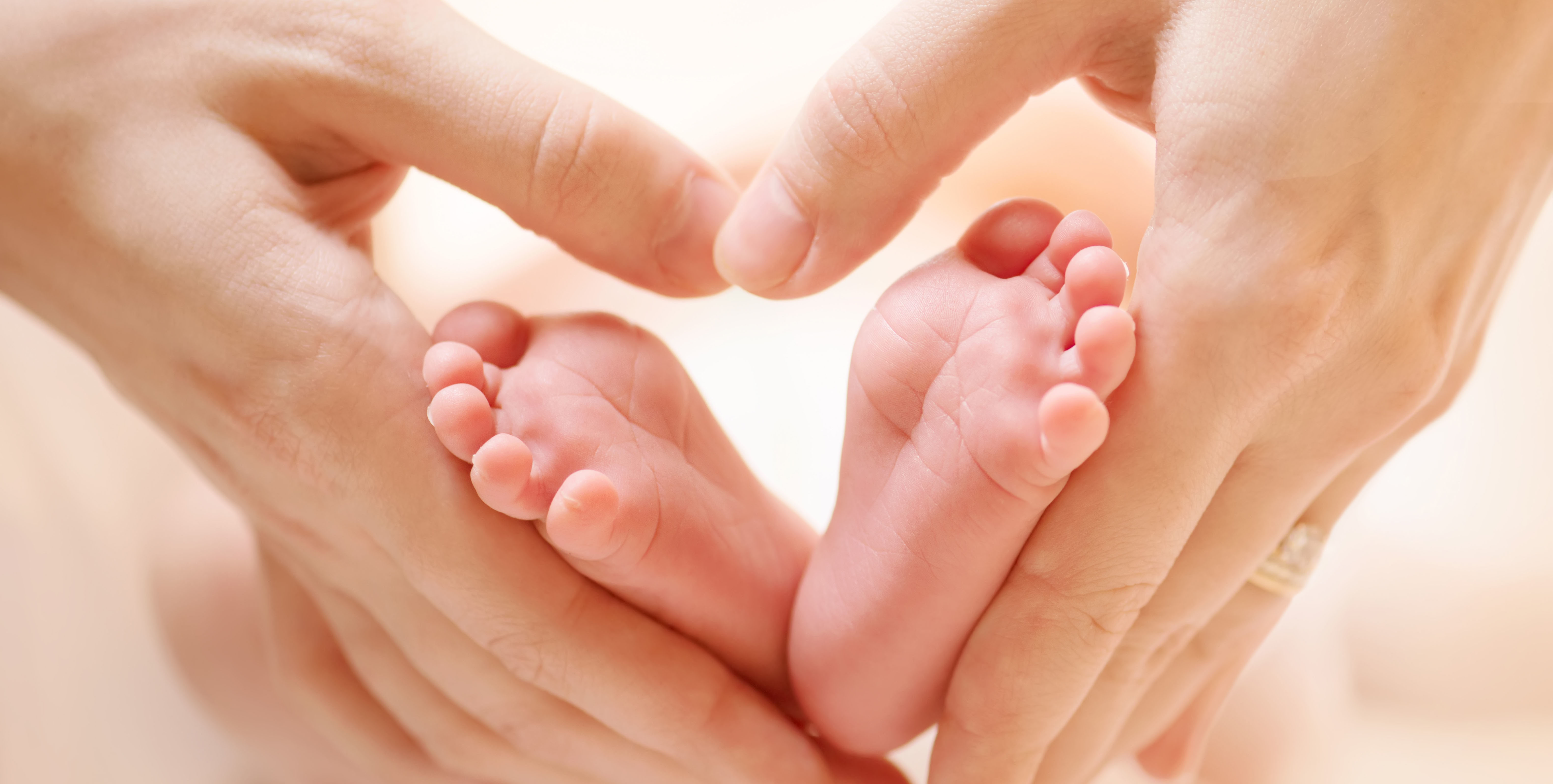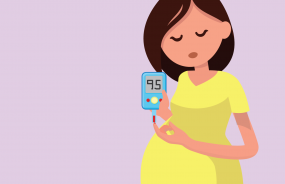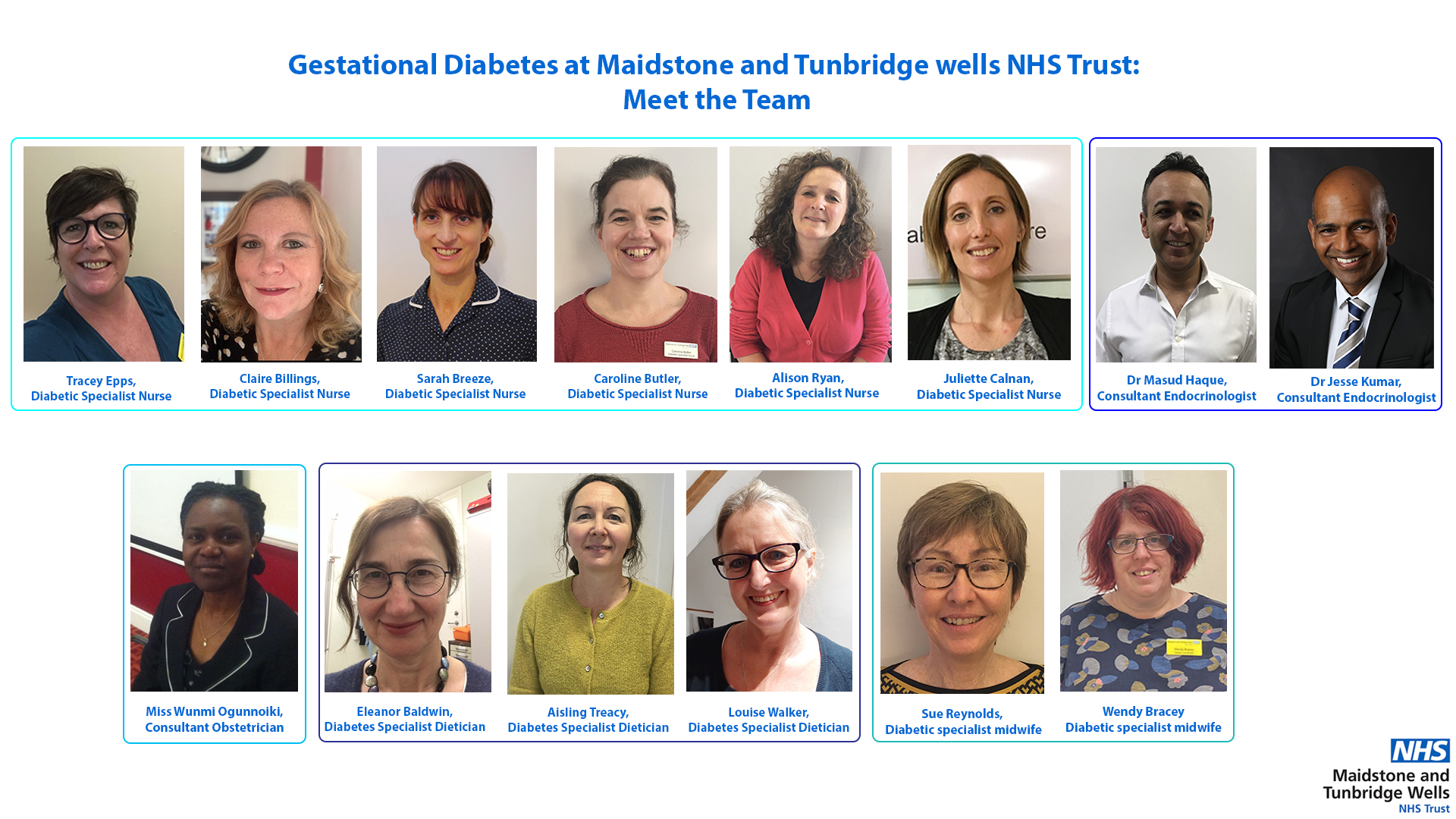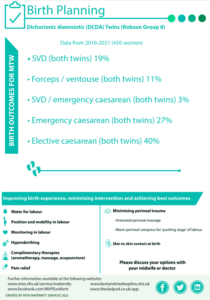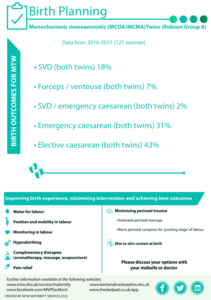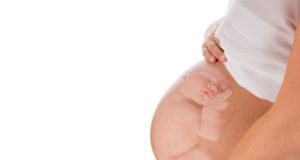This list is not exhaustive of conditions that may lead to additional care for yourself or your baby. Please visit this link for information about our neonatal services at Maidstone and Tunbridge Wells.
Diabetes
If you are thinking about trying for a baby and you have Diabetes, please speak to your Diabetes specialist nurse or your GP- You may find this information here helpful.
Whether you have Type 1 or Type 2 Diabetes at the start of your pregnancy you will be under the care of the Diabetes specialist team involving a Consultant, Diabetes Nurse, Diabetes Midwife, Dietician and an Endocrinologist (Diabetes specialist). Your care will be specifically tailored to your needs. Your Diabetes nurse or GP will help you manage your diabetes prior to seeing your midwife.
More information is available here.
Gestational Diabetes is the development of diabetes in pregnancy and is detected by a blood test, usually performed at 28 weeks of pregnancy if needed. The hormones produced during pregnancy can make it difficult for your body to process starchy and sugary foods, resulting in Gestational diabetes. For more information visit the Diabetes.org website here. Or the NHS UK website.
If you are diagnosed with Gestational Diabetes in your pregnancy, you will be invited to a group education session to discuss your on-going care.
Colostrum collecting while still pregnant, or in labour, can help to make breastfeeding more successful. It is especially useful for women certain pregnancy and baby related conditions, such as Gestational Diabetes, raised BMI, premature babies and babies with increased risk of hypoglycaemia. Click here for more information or watch our our short video for information and a practical demonstration.
Meet the Diabetes team
We have created a series of videos to support you if you have been diagnosed with Gestational Diabetes.
An introduction to your care
Supporting you in your pregnancy
A healthy diet in pregnancy
Supporting you through labour, birth and beyond
How to test your blood glucose
Multiple pregnancies
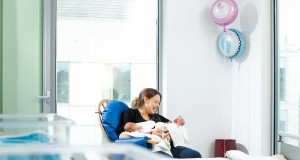 In the UK about one in every 63 pregnancies results in a multiple birth. There has been an upward trend in the numbers over the last 20 years. Expecting twins or triplets can be an exciting yet worrying time for parents.
In the UK about one in every 63 pregnancies results in a multiple birth. There has been an upward trend in the numbers over the last 20 years. Expecting twins or triplets can be an exciting yet worrying time for parents.
At Maidstone and Tunbridge Wells NHS Trust we run a specific clinic through our Antenatal Clinic for parents expecting twins or triplets. You will have an extended first appointment with one of our specialist multiple pregnancy midwives who will continue to see you throughout your pregnancy at either Tunbridge Wells Hospital or Maidstone Hospital. They work closely with the consultants who will develop a plan of care with you for your pregnancy, including additional scans and appointments.
For more information click here.
Please visit the http://www.multiplebirths.org.uk website or http://www.bliss.org.uk for information about multiple pregnancies.
Multiple pregnancy leaflet from the Royal College of Obstetricians and Gynaecologists RCOG
Infographic for labour and birth – DCDA twins 2022 Infographics for labour and birth – MCDA/MCMA twins 2022
Breech
Most babies who are in a bottom down (breech) position will turn to the normal head down position (cephalic) by 37 weeks. After 37 weeks they are much less likely to turn by themselves. However, it is often possible to manually turn a baby head down by applying gentle pressure on the mother’s abdomen, improving the chances of having a vaginal birth. This technique is known as an External Cephalic Version or ECV. if your baby is breech your midwife or doctor will discuss the possibility of an ECV with you, including the risks and benefits. If an ECV is agreed then you will be given an appointment and information about coming in to hospital for the procedure.
We also offer Moxibustion as an alternative option for trying to turn your baby. This is a traditional Chinese technique using ‘moxa sticks’ (made from an herb) as a gentle heat source applied to acupuncture points on your feet. Some scientific studies suggest it can be effective, but it hasn’t been researched well enough for us to be sure. Please speak to your Midwife or Consultant.
Visit the NHS website here.
Birth after Caesarean
Most women who have had one previous caesarean section can choose to give birth vaginally next time. At Maidstone and Tunbridge Wells NHS Trust we aim to support you with having a vaginal birth, sometimes called VBAC (Vaginal birth after caesarean). Your options should be discussed with you in a Specialist midwifery clinic after your 20 week scan. You will also be seen by an Obstetrician by 32 weeks to discuss your birth peferences. The RCOG (Royal College of Obstetricians and Gynaecologists) have this handy leaflet to give you more information – you can access it here.
Support For Complex Social Issues
Your midwife will be able to support you with any concerns you may have. For additional support, you may find the following websites/support groups useful:
Change Grow Live
Change Grow Live provides local support and treatment services for those living in West Kent (Dartford, Gravesham and Swanley, Maidstone, Sevenoaks, Tunbridge Wells and Tonbridge and Malling)
Website: https://www.changegrowlive.org/
Alcoholics Anonymous
AA provides support groups and online forums for individuals struggling with alcoholism.
Website: Alcoholics Anonymous Great Britain (alcoholics-anonymous.org.uk)
Domestic Abuse Support Services in Kent and Medway
The Domestic Abuse Support in Kent provides advice and information on services for victims, friends and family, and perpetrators of domestic abuse.
Website: Domestic Abuse (domesticabuseservices.org.uk)

